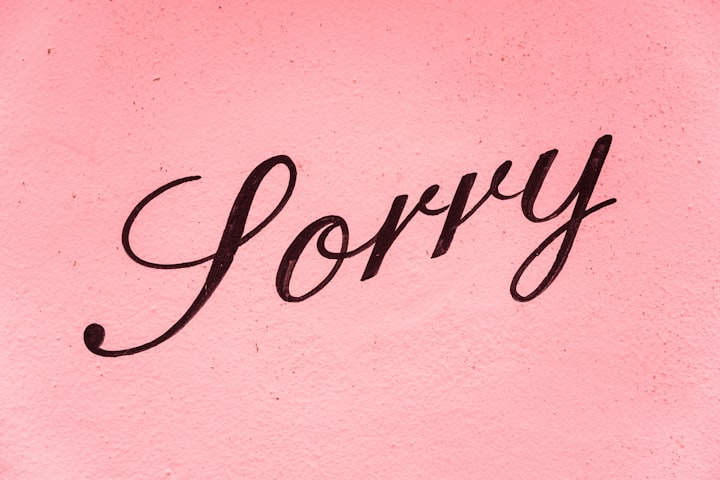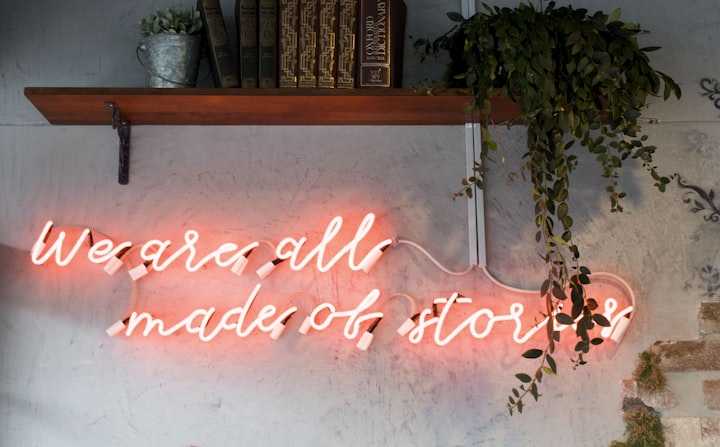If They Wanted to Apologize, They Would
Stop looking for a gift they have no intention of giving.

In terms of closure, there are few things more powerful than an apology. Giving an apology after making the wrong choice is a healing balm. It lets the other person know that you feel remorse, but more than that it’s a promise. A promise to change behavior. A promise to be better, kinder, more compassionate or understanding the next time.
Apologies represent all of those things.
To give and receive apologies is an important piece of the relationship puzzle. We must be able to apologize for the mistakes that we make. In the same vein, our partners must be willing to give those same apologies when they get it wrong.
What happens when we don’t get apologies in moments of wrongdoing?
Cracks form. Trust disintegrates. Resentments build.
It’s hard to keep your relationship in a state of forward momentum when you have those kinds of divides; when someone isn’t willing to be remorseful, human.
Here’s the real killer, though: you can’t make your partner apologize. You can’t make them right the wrongs or feel remorse for the behaviors that have hurt you. This is where so many people run into a wall. When their partner or spouse harms them, they push to get resolution. But some people don’t want to give that resolution. Sound familiar? Then read on.
Some people don’t like to apologize.
Let’s face it, some people aren’t apologizers. It doesn’t matter what kind of apology. Saying “sorry” isn’t always a matter of verbal remorse. More than anything, it’s changed behavior. Unfortunately, change is something many people resist. Some partners don’t like to change and certain personalities like the idea of apologizing to someone they’ve wronged even less…
Emotional immaturity
Genuine apologies come from emotionally mature people. That’s a really important point to understand before any further considerations about apologies are made. Real apologies come on the back of real remorse, which is rooted in empathy.
Empathy - understanding how someone’s emotions motivate them - comes on the back of emotional intelligence. When someone is empathetic it shows they’ve searched their emotions and studied those same feelings in others.
An emotionally immature person misses out on the apologies their loved ones need. They’re so caught up in cycles of doing what they want (without thinking) that there’s never time to consider others, or what would help them empathetically in the process.
Narcissistic appeal
Narcissists are everywhere, but they are especially common in the relationships of unhealed and traumatized people. It’s the perfect place for them to hide. With a lack of empathy and an inability to self-soothe, they can take advantage of these types of people and dump all their negative emotions and behaviors on them.
Apologies never come for those who are still in the loop of dating narcissistic people. Their narcissistic partners will lash out, destory their lives, and even turn other people against them - all without so much as an apology. Why?
More reasons will be discussed below but, in short, it’s because narcissistic people always feel justified to commit the harmful behavior in the first place (and know it’s harmful when they make the choice).
Set in the pattern
People are nothing if not pattern-hunters. We love a good pattern. Usually, those patterns are hard-set, like concrete. As children, we watch them repeat in our parents and our peers. Then, when we grow up, a lot of us go on repeating those behaviors, those choices, those outbursts. We create the same cycles of thrive and fail over and over again.
Some people wake up. They realize that the patterns aren’t suited to them and they decide to make a chance. Therapy, new friends, new environments. But a big, big part of this shifting the pattern is apologizing for wrongs.
That’s where the sleepers remain. Those who don’t wake up and break their patterns keep cycling through the same mistakes. Failing to take accountability, failing to apologize, is very often a big part of this repeating cycle for those with heartbreak relationship histories.
Total avoidance
In this life, there are confronters and there are avoidars. The confronters do what it says on the tin. When things go wrong, they face them down. The worst moments in their lives are faced like pulling off a bandaid. They look them in the eye and swallow the hard stuff (with their noses pinched if they must).
That’s not how it goes for the avoiders. For them, apologies are like peeling off their skin. They would rather throw themselves in a (figurative) meat grinder than look someone in the eye and tell them, “I screwed up. I’m really sorry.”
The avoider is a person who runs from apologies and runs from accountability - not necessarily for malicious reaons. They do it more out of fear than anything else.
If they wanted to apologize, they would.
Here’s the thing about all the explanations above. While these partner-types may be people who don’t give up apologies willingly, they are not excuses for that lack of apology. Every single person that you fall in love with, who you invest in emotionally, has the ability to apologize. Cognitively (consciously) they know what apologies are, and they know that they are important. But they choose not to give them genuinely when it matters.
A narcissistic person is not incapable of feeling remorse and apologizing. They choose, because of their personality type, not to feel those things. For them, it’s more powerful, more pleasurable, to deny their loved ones apology. It’s easier for them to avoid empathy and punish people around them instead.
We can see similar patterns in the emotionally immature person. We see it in the avoider and the pattern-hound. All of these people, on a mental level, are capable of apologizing. In fact, you can probably find them doing it easily when the stakes are low-pressure. (Meaning it has no real emotional value to them, or it costs them nothing in terms of “reputation.”)
These people, for one reason or the other, choose not to apologize. They choose to keep cycling through the misery, through the upset. They choose to sew chaos and disension in their relationships. Why? Because it’s the easier path for them. It’s more convenient. It’s more comfortable. In every case, consciously or subconsciously, they’re choosing themselves.
Where does that leave you in the process?
As with any knowledge, this realization leaves us all in a different place. You can’t have such a knowing and not act. Once you realize that you’re partnered with an adult who chooses not to apologize, you have to figure out what steps you’re going to take in order to protect your emotional wellbeing and the needs you’re trying to meet.
If you’re caught in the lurch with a spouse or partner who refuses to apologize, this leaves you with 3 big questions to ask yourself:
- What does your future look like?
- What does your future feel like?
- Are you willing to stay the same?
You have to figure out where you’re at in the relationship and whether or not this pattern of apology refusal works for you. Start by looking at your future. When you consider your ideal relationship, what you thought happy ever after would look like, was this it? How is this lack of apology making you feel? Can a healthy relationship be built on those emotions?
At this point, you can stage a conversation with your partner (if it’s safe and effective to do so). Explain what your ideal relationship provides you. Describe your needs and tell them how the lack of apology is affecting your ability to trust or connect with them.
If you’re still not there, look to the future again. How do you want to feel in a relationship? How often do you feel that way in this relationship?
A partner’s unwillingness to apologize can create divides that are impossible to build on. You can’t find happiness in a place where your core needs aren’t being met, where you’re caught in a cycle of hurt-and-repeat. Are you willing to stay that way? Are you willing to teach your children those lessons? To keep yourself small for someone who chooses not to apologize?
That’s the final question to answer, and only you can answer it.
Someone’s inability to apologize is no small thing. When we apologize we show what is best in us, we show our most human aspects. It’s a beautiful thing. Being able to admit that you were wrong is admitting that you are capable of great growth, and great compassion.
Do you want to be with someone who is beautifully human? Someone who is capable of becoming better? Becoming stronger as a team? Or do you want to settle for someone who prefers to leave you out for their own emotional comfort?
If nothing else, take this moment to revalue your own apologies. Where do you take accountability in your life? Your relationships? Are you giving your partner these same indications of growth, humanity, and empathy? Perhaps this is the moment for all of us to become something better than we were by embracing the art of apology.
© E.B. Johnson 2023
About the Creator
E.B. Johnson
E.B. Johnson is a writer, coach, and podcaster who likes to explore the line between humanity and chaos.







Comments (14)
Nice article that gives us a lot to think about! I'm an avoider but I'm pretty good with apologies. In anxious/avoidant couples it not really clear if one side is "better" than the other. there's a lot of great videos on the topic https://www.youtube.com/watch?v=OYoIVCHVwKI
Excellent analysis and sound advice. Made me look within and want to be a better apologizer. Some people confuse strength with emotional coldness and distance. Some others, insecure in themselves, apologize for even the insignificant iotas. Becoming self aware is key.
Nice work ❤️❤️ I wish I could cope with my stories
check this https://vocal.media/humans/psychological-facts-d9wr00x3
Yes! I hate that movie quote 'love means never having to say you're sorry'. Love means acknowledging mistakes and working to be better! I've had experiences with narcissists and they definitely don't like to apologise! I really enjoyed your article, thank for writing and sharing!
Truth be Told some people don't want to apologize- Congratulations on your Top Story🎉🎉🎉🎉🎉🎉
Congratulations on top story,
I have come in contact with a few narcissists, and I keep wondering if they are capable of apology, do they consider it beneath them, or is it just not built into their psyche. I am still not sure. Apologizing, when it is warranted, is the most freeing of feelings, one's heart is lighter and life shines brighter. What is not to understand there. I thoroughly enjoyed your article. It so warrants a Top Story. Congrats.
Think that there is some great advice here and well-written for people to follow. Congrats on TS!
More people definitely need to learn the art of the apology!
respected madam This article is absolutely excellent and packed with informative content. thank you for drafting an interesting ethical content god bless
Congratulations 🥳 This was well written and researched 👌✨❤️
A very important message for all of us to consider. I have no problem apologizing... anymore. I was one of those people, but my reasoning was... I just didn't want to experience the feeling that comes during the actual apology. That feeling of being a dumbass and not knowing if their feelings for me will change. But I understand now, as you said...It's part of the healing process and therefore necessary to apologize every time. thank you for sharing. and congrats on your Top Story!
A good piece, few things worse than an empty apology or a blank space where an apology ought to be.